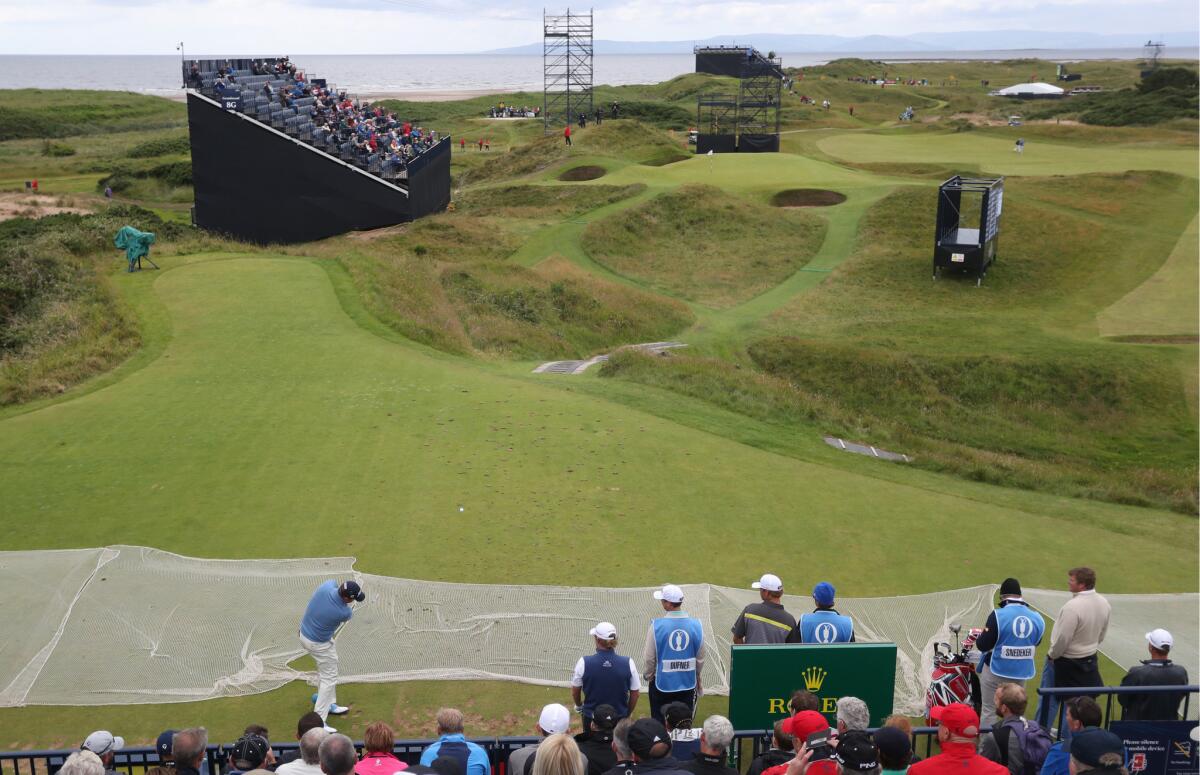This short hole can be a long ordeal

- Share via
Reporting from TROON, Scotland — There is a noted celebrity on the course this week for the British Open at Royal Troon.
He’s short of stature, but stout. The first site of him produces a twinkle in the eye of golf fans, though the players themselves will cast a wary glance and be guarded in his presence, hoping their meetings will be brief.
Meet the Postage Stamp eighth hole at Troon — 123 yards of pain and pleasure, all depending on your perspective.
There’s a Postage Stamp T-shirt in the Open’s merchandise pavilion. American golf artist Lee Wybranski chose to feature the hole in his signature painting for the tournament, even adding the perforated edges of a stamp for accent.
On buses all over Scotland, a mural of the Stamp advertises this year’s 145th playing of the Open that begins Thursday.
In TV coverage this week, the hole will have a camera mounted to a zip-line.
Why such a fuss?
Because in golf’s bombers age, when par-threes are being stretched to ridiculous lengths (300 yards in this year’s U.S. Open), the Stamp is unique. It is the shortest hole on the British Open rota, and among the smallest played in any major, standing beside a couple of other great ones — the 12th at Augusta National and the seventh at Pebble Beach.
Among the bantamweights, it is the biggest brute.
Ask Rory McIlroy.
“Bit of a struggle at the Postage Stamp for me,” McIlroy said in an understatement after his practice round Tuesday.
The world No. 4 pushed his tee shot to the right and ended up, pin-high, in one of The Stamp’s five cavernous bunkers. Poor McIlroy had just finished filming a breezy interview with a TV crew, so they were there to tape him taking six shots to extricate himself — which of course went viral on the web in a matter of minutes.
From the sand that is the consistency of fine clay, three of McIlroy’s shots slammed into the face of the steep bunker. He lifted two out, only to have the ball not clear the slope and roll back in. McIlroy tripled the par with a nine, and if that happened in the tournament he would have doomed himself in a matter of 10 minutes.
“It’s one of those holes where you just try to hit it in the middle of the green,” McIlroy said. “Even though it’s only 115, 120 yards, you just have to not be that aggressive. … Even hitting it into the middle of the green is a good shot, and then take two putts.
“If you take four threes there this week, you’re probably going to gain a bit of ground on the field.”
Not surprisingly, the Postage Stamp’s history at 138-year-old Troon is filled with tidbits.
It got its name in the early 1900s from two-time Open champion Willie Park Jr., who described it in a magazine article as “a pitching surface skimmed down to the size of a postage stamp.”
Ernie Els aced the eighth in the 2004 British Open, but the most famous hole-in-one there came in 1973. Gene Sarazen, at age 71 and playing in the 50th anniversary of his first Open, carved a five-iron into a stiff breeze and the ball found the cup.
Incredibly, 45 minutes earlier, 19-year-old Scotsman David Russel became the youngest to score an ace in the Open at the Postage Stamp.
The next day, Sarazen holed out a bunker shot at No. 8 for birdie. He missed the cut, but took three strokes in two days at the Stamp.
That is 12 fewer than what is believed to be the highest score in major competition at Troon’s eighth, suffered by German amateur Hermann Tissies in the 1950 Open.
“It’s a special hole, the way that the short par-3s of this world are special,” said Colin Montgomerie, who grew up at Troon. “There’s never been a decent par-three over 200 yards, in my opinion, built. [At] 123 yards, the expectation raises dramatically into: you are on that tee and you are a professional golfer; it’s your job and you’re expected to hit this green at 123 yards. You could throw in on, really. I wish I could. And that’s why it’s difficult.”
The green is so long and narrow that there is very little space beyond sand to miss it on the sides. It would be a tough target to hit playing indoors. In the nearly ever-present Scottish wind, the margin for error is tiny. The prevailing breeze coming off the nearby sea is left to right, steering shots toward the troublesome bunker for McIlroy at practice.
When circumstances require a variety of clubs from 6-iron to a three-quarter wedge, that’s special.
“Anyone who wants to see potential train wrecks, if it’s blowing hard into it off the left, that would be the place to sit,” Henrik Stenson said.
We’ll be watching from our armchairs. Troon’s celebrity has our full attention.
tod.leonard@sduniontribune.com
More to Read
Go beyond the scoreboard
Get the latest on L.A.'s teams in the daily Sports Report newsletter.
You may occasionally receive promotional content from the Los Angeles Times.










